HIT CHANNEL EXCLUSIVE INTERVIEW: March 2016. We had the great honour to talk with a legendary musician: Richard Sinclair. He’s best known as a founding member, bassist and vocalist of Caravan. He has also been a member of The Wilde Flowers, Hatfield and the North, Camel and Caravan of Dreams. In addition, he played on Robert Wyatt’s “Rock Bottom” (1974) album and performed with him the song “I’m a Believer” (The Monkees) on Top of the Pops. Read below the very interesting things he told us:
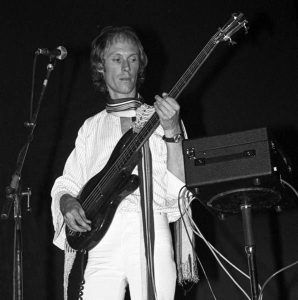 What are the current projects you are involved in?
What are the current projects you are involved in?
I have my own band that I play. I am involved, at the moment, in making two new CD’s of my own music with my own lyrics and I hope to release them until the end of the year. I play my own music and I am working with some local musicians and friends. One of them is Angelo Lossaso, who is my drummer. I have played several times and I have recorded with a band called douBt. I work with quite a few young bands helping them with their music, in the last two years, here in Italy. I don’t work with a record company, I am working with great people and I am making new music. They can reach me on the phone by themselves.
How did you start playing with the Wilde Flowers?
I was born in Canterbury and lived in Canterbury and my father was a musician in Canterbury. He was a singer, a double bass player and also played the drums. So, all my influences in my music come from my father. Hugh and Brian Hopper’s parents, Mr. and Mrs. Hopper, used to go and see my father playing at the local hotels and auditoriums. He played all the pop standards from the 1930s until the end of the ‘50s. We are in the early 1960s when Hoppers’ parents met with my father. Their sons, Hugh (bass) and Brian (lead guitar, saxophone, vocals) were forming a band and they were interested about me being a guitarist. One day Hugh called me on the phone and asked me to come to the Hoppers home to play music together and slowly the Wild Flowers were formed. They invited Robert Wyatt to play drums and Kevin Ayers to sing. I was 16 years old. The others were a bit older. I mostly played with the Wild Flowers at local pubs. We usually played Chuck Berry and Mose Allison’s music and other pop and rock music, a little bit different from all the other bands in Canterbury at the time. I met Pye Hastings (guitar, vocals) at the first show of the Wilde Flowers at the Bear and Key Hotel. Kevin Ayers’ girlfriend, Jane, was Pye Hastings’ sister. Then, I decided to concentrate on my college work. When I left the Wild Flowers, Pye has been asked to join them.
Were the Soft Machine a role model for Caravan in their early days?
Yes, obviously they were our role model and we were following their footsteps. Caravan played with the Soft Machine at festivals and tours. They were the first band from Canterbury who did that. After Pye, Richard Coughlan (drums) and my cousin Dave Sinclair, joined the Wilde Flowers. When Robert (ed: Wyatt) and Kevin (ed: Ayers) stopped playing with the Wilde Flowers, they formed a band called the Soft Machine with Daevid Allen (guitars, vocals) and Mike Ratledge (keyboards). Mike Ratledge’s father was my headmaster. What happened was that the Soft Machine started to rehearse at Pye’s sister’s house. She rent a house and Kevin visited her very often. Also, I remember Robert and Daevid Allen there. They were rehearsing a song with all their gear outside and it was beautiful. Pye Hastings, Richard Coughlan and Dave Sinclair had formed a band and they asked me to join that band. We rented a house in Whitstable, in Westgate Terrace, so we could rehearse. When the Soft Machine were on tour in America with the Jimi Hendrix Experience, they left us all their equipment. So, we had all the Soft Machine equipment. Pye was very influenced by the guitar of Soft Machine. Obviously, they were like a family and friends to us.
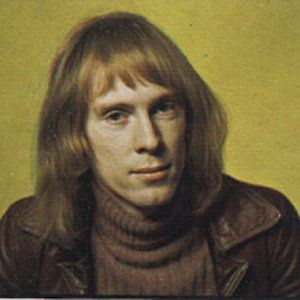 Do you have happy memories of Frank Zappa’s jam with Caravan at the Actuel Festival in Belgium on 26 October 1969?
Do you have happy memories of Frank Zappa’s jam with Caravan at the Actuel Festival in Belgium on 26 October 1969?
Yes. We played at a place called Amougies, in a very large tent. Frank Zappa was there to play with everybody. Not just with us, with everybody. He decided to play 10 minutes with everybody. He played one song with us. We played one number of us, “If I Could Do it All Over Again, I’d Do it All Over You”. We made it last 10 minutes. He played a very good solo on it. It was a very nice festival. Many great bands played there: the Soft Machine, The Nice. The Nice played on the same day with us.
How the amazing song “For Richard” from “If I Could Do It All Over Again, I’d Do It All Over You” album (1970) got its name?
Dave. I came after the riff (ed: he sings it). He wrote the music. He created the melody of the organ based on my riff and he called it “For Richard”.
How helpful were the appearances of Caravan on TV shows like Colour Me Pop, Top of the Pops and Beat Club?
Obviously were very helpful. When Caravan were formed we did many concerts. We played all around Canterbury. When we finally got a record contract, we had three offers. We decided to sign with Verve. We played at Middle Earth club in London. London was quite interesting at the time. They liked what we did and the offered us a record contract. We had a manager, Terry King, and he organised a lot of things for us. Our first album got some airplay on radio shows. On those days, radio shows were very important and it was a great thing to play on a TV show. We managed to play on a TV show called “Colour Me Pop”. Later, we played on Beat Club in Germany and on Top of the Pops. On radio, they were playing Caravan music. Those TV shows were very nice. We gained a lot of publicity but we didn’t make any money then. With Caravan we never made any money. But we were very popular.
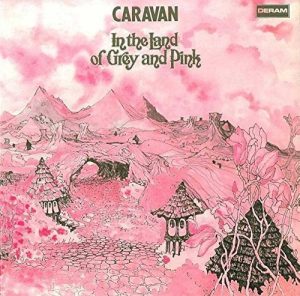 Are you proud of the classic status that “In the Land of Grey and Pink” (1971) album has?
Are you proud of the classic status that “In the Land of Grey and Pink” (1971) album has?
I am happy that people like it. We had great riffs and we were happy with what Dave was playing. We created some amazing music together and it sounds well. I am happy that people still like it. I am happy that I reformed the band in 1990. It was my idea to reform the band and do live shows. As I did with Hatfield and the North. I left Caravan because I wanted to play more music. Dave Sinclair left after “In the Land of Grey and Pink” and he was replaced by Phil Miller’s (Matching Mole -guitar) brother, Steve Miller (keyboards). We did one album with Steve Miller, “Waterloo Lily” (1972). Then I left the band, and I started playing music with Phil Miller, Steve Miller and also Pip Pyle (Gong -drums). Pip Pyle played with Phil Miller in Delivery. Phil had joined Robert Wyatt in Matching Mole. Phil had problems with his brother, Steve, who left the band. He was replaced by Dave Sinclair, who played with Phil in Matching Mole. Eventually we were called Hatfield and the North. Dave didn’t stay long.
What was your inspiration for the song “Golf Girl” (from “In the Land of Grey and Pink”)?
We lived in Canterbury at the time. We lived very close to a golf course. I had these words and melody: “Standing on a golf course/ Dressed in P.V.C./ I chanced upon a Golf Girl/ Selling cups of tea”. That was the first song I wrote.
How much impact had Dave Sinclair’s departure from Caravan after “In the Land of Grey and Pink”?
When Dave left, we carried on with Steve Miller, but it changed the context of the band. He made it a little bit more jazzy, a little bit more bluesy. But it didn’t really work out well, indeed. Both Richard and Pye wanted the band to play straight-ahead pop/rock. I wasn’t very pleased with that direction. I want music to be more harmonic. After Dave left, the harmonic experience of keyboards had gone. Steve Miller was a good pianist, but he wasn’t as creative at keyboards as Dave was.
Are you satisfied with Steven Wilson’s 40th anniversary remix of “In the Land of Grey and Pink”?
I have not heard it. Steven Wilson from Porcupine Tree? I have no idea about his remix.
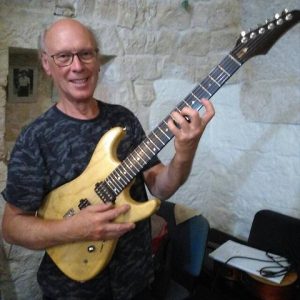 Did you enjoy the Caravan reunion in 1990?
Did you enjoy the Caravan reunion in 1990?
I organised it. Yes, I organised it on my own, with my new partner, Heather Kinnear. I made on my own two rehearsals in Canterbury. It was quite hard to regain that magic. You know, it was very hard. We nearly did it. We nearly did. We hadn’t played that music together since 1982. So, it was quite hard.
Do you miss Richard Coughlan (Caravan drummer –died in 2013)?
Yes, it is very sad that he passed away because he was the driving force of Caravan. The actual combination of the first band. Especially, Dave’s amazing keyboard playing and Pye’s writing and words. I went to see Caravan recently. When they started to play the old songs, there was not the magic that there was in the past. It’s different now. Their own music now I don’t think it is so interesting. I am not interested. I am happy that they are still doing it and I am wishing them well.
Did you have a good time playing on Robert Wyatt’s “Rock Bottom” (1974) album?
Yes. I was there as a session player. We didn’t play music together. I did overdubs. I added my parts to what the others had already recorded. I was on my own in a different studio. There were many great musicians on this record: Mike Oldfield, Hugh Hopper and Fred Frith (Henry Cow – guitar). I wasn’t in the same studio with the band. I didn’t play with the band. A lot of people say that we did the album together, but I didn’t see Robert then.
Was it an interesting experience to play “I am a Believer” on Top of the Pops (1974) with Robert Wyatt, Nick Mason and Fred Frith ?
Yes, it was funny. It was a nice experience to make that single. Then, we had to do this Top of the Pops show. Funny. Robert is a funny guy. We didn’t play the music live on the programme, it’s all miming. Andy Summers (The Police –guitar), who is a great guitarist, was also there. The only music we played together that day, was outside the studio. It was at Dave MacRae’s (Matching Mole –keyboards) house. In the studio, we were only miming. It was difficult for Robert who was in a wheelchair and the producers of the show didn’t want to film him. It was difficult for Robert because that was his pop song. So, there were bad moments, too. For me, it was a great time to be part of a pop backing band in Robert’s pop song. It’s a very nice line-up, wasn’t it? It’s an interesting line-up (laughs).
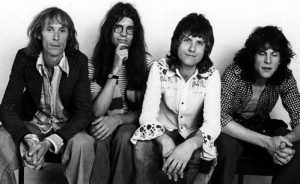 Why you said that the music of Hatfield and the North became too mechanically structured?
Why you said that the music of Hatfield and the North became too mechanically structured?
The band wrote songs that their structure wasn’t so interesting to me. The ideas were fine. They still had nice ideas, but the actual feeling in the band wasn’t right. That’s why I left the band. I want songs to have more outside references. I wanted to have more interaction when we played live. In those days, the music was so loud and noisy. We weren’t performing music that we came up together live. It was all about playing the music correctly. It wasn’t about really enjoying it; it was about how you played it. I wasn’t interested in the mechanics of the music by Dave Stewart (Egg –keyboards) and Phil Miller. It wasn’t bad. I enjoyed much of that music but I didn’t feel that the spirit of the band at the time was right, so I decided to quit. This doesn’t mean that the ideas that they put together weren’t fine.
What do you remember the most of the period you played with Camel?
I think that was a special time for me. When I joined the band, the music for the “Rain Dances” (1977) was ready. I just recorded it. It was fine. I went there and I really enjoyed what I did. They had already composed the music. I was happy to be in a nice band and in a nice work. I think my playing was a bit more reserved playing Camel music because their music was structured in a certain way. It worked, indeed. It worked. We did two studio albums and we played nice concerts. It was the most professional band I have even been. It was very dominated by Andy Latimer, who always wanted to have the final say in the music and the way everyone played and that’s why Peter Bardens (keyboards) left. There was a tension sometimes between Andy Latimer and Peter Bardens. I think Peter believed that his quality was bigger and he didn’t want to stay in a band which was dominated by a leader. I am happy that I got Andy Latimer start singing. He wasn’t singing then. Now, he sings.
Why you decided to move to Martina Franca, Italy?
I had already lived for 4 years in Poland. I lived in a city and I wanted to live in the countryside. The weather in Poland is completely different: much more extreme and much wetter. Everything is stronger. So I moved to Italy, located down here. I came to Italy with the reunited Caravan in 1990. Caravan had thousands of fans in Italy, everywhere we played. I started to make friends here and all were fans of my music. Italy is a lovely place to live and I had many friends here. So, another 16 years passed before I had to move to Italy. Shorty after the Caravan reunion, I formed my own band called Caravan of Dreams. In Caravan of Dreams I played with musicians I had played in the past like Dave Sinclair, Jimmy Hastings (Caravan –saxophone, flute) and Andy Ward (Camel –drums). We made an album together. With Caravan of Dreams I came back to Italy and we played in Perugia at Rockin’ Umbria Festival. I decided to go downtown. I also went to see other places in South Italy and I thought that I would like to live here. Eventually, Caravan of Dreams ended and I went solo. I did a solo album, called “R.S.V.P” in 1994 and I thought to live somewhere else. I went to Poland for 4 years. In 2005, I came to Italy with Hatfield and the North to play at Fasano Jazz festival. When Hatfield and the North finished after the death of Pip Pyle, I decided to move to Italy. I live here since 2006, working on my own music and playing with friends from Lecce and Taranto. I also help newer bands, although I am not listening to new music.
In your opinion, what made the Canterbury Scene so unique?
I think the harmony that has been there. I think it’s a unique place for music, anyway. Personally, I see outside the popular “Canterbury Scene” moniker. Great music wasn’t only created there. It is related with the pop scene of the time. There wasn’t only in Southern England. In Canterbury, there were so imaginative writers and so wonderful people like Kevin Ayers, Daevid Allen, my cousin Dave, Phil Miller and Robert Wyatt. They were so talented songwriters. The melody and the harmony in our music were obviously influenced by the church. Even by poetry: Daevid Allen, myself and Pye Hastings. Every band I have joined, has been related with my sound, the sound of Canterbury. I also enjoy music outside Canterbury, especially singers whose voice I find particularly moving, like Bobby McFerrin and other people.
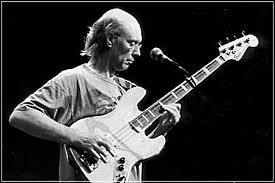 Are you happy with your participation in the documentary “Romantic Warriors III: Canterbury Tales” (2015)?
Are you happy with your participation in the documentary “Romantic Warriors III: Canterbury Tales” (2015)?
I keep wondering: “Am I happy with that?” and then I answer: “Why not?” (laughs). I think the story was much bigger than that. There were great musicians and performers who never became popular and sold records. But they were all good writers. Everybody who played music there, was a great musician and not all of them, were born in Canterbury, as I did, but they are all Canterbury-related. They created, lived and went to school in Canterbury. Robert (Wyatt) wasn’t born in Canterbury, he was born in Bristol, but he went to the Canterbury Grammar School. You know, I love that stuff.
Can you tell us one or two of your favourite albums as a listener?
I love hundreds of albums. They are not pop. They are all jazz records. I love John McLaughlin, John Scofield, Pat Martino and Mike Stern. My favourite albums have not been made yet, and they are mine (laughs). I will release two new albums and I hope people will be interested in my music and buy it… The music in the past was more interesting, it had more free form. It was more creative. Now, it’s very repetitive. It doesn’t last… The first Soft Machine record was immensely influential to Caravan. Especially the sound of the organ and the bass. The bass player. Kevin (Ayers) was a great bass player. Not many people know how good bass player Kevin was. He came up with very interesting, melodic music.
A huge “THANK YOU” to Mr Richard Sinclair for his time.
Contact Richard Sinclair at: [email protected]

